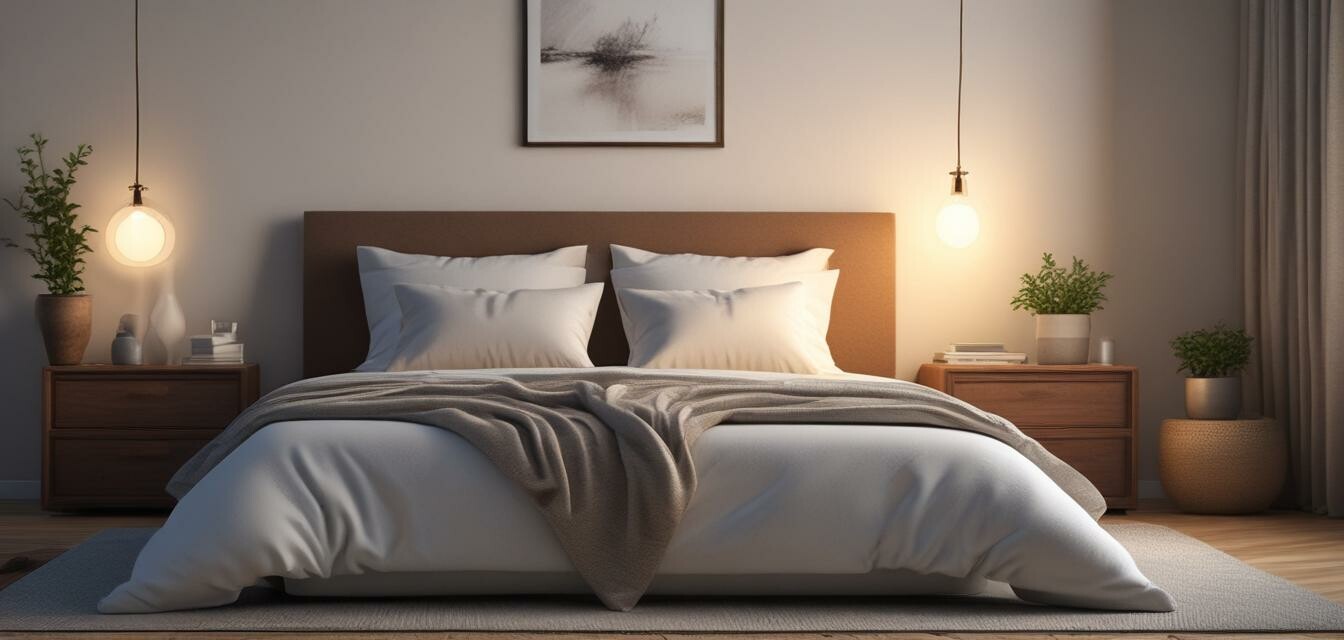
Creating a relaxing sleep environment
Key Takeaways
- Comfortable bedding is crucial for quality sleep.
- Aromatherapy can enhance relaxation and promote restful sleep.
- Controlling noise levels contributes greatly to a serene atmosphere.
- Maintain a cool, dark room to improve sleep quality.
- Personalize your space with calming colors andminimalistic decor.
Your sleep environment plays an essential role in how well you rest each night. From the colors on your walls to the scents wafting through the air, every little detail can contribute to a peaceful slumber. This article will guide you through creating a sleep-friendly environment where relaxation can flourish. We'll cover everything from your bedding to atmospheric elements that help in achieving better sleep quality.
Choosing the right bedding
The foundation of a good sleep environment starts with bedding. Your choice can greatly influence your overall comfort. Here are some factors to consider when selecting bedding:
- Mattress: Invest in a quality mattress that supports your body and relieves pressure points.
- Pillows: Choose pillows that suit your sleeping style, whether you sleep on your back, side, or stomach.
- Sheets: Opt for breathable sheets made of cotton, linen, or bamboo for optimal temperature regulation.
- Blankets: Use weighted or insulating blankets to keep you warm and cozy without overheating.
Incorporating aromatherapy
Aromatherapy can be an effective tool for relaxation and preparing your mind for sleep. Certain scents have calming properties that can help in achieving a tranquil atmosphere. Consider these aromatic options:
- Lavender: Known for its soothing aroma that may help you unwind.
- Chamomile: A gentle scent that promotes relaxation.
- Rosemary: Often associated with clarity and calm.
- Frankincense: Can create a sense of peace and tranquility.
Essential oils can be applied through diffusers, roll-ons, or added to a warm bath before bedtime. For more information on incorporating aromatherapy into your wellness routine, check out our Aromatherapy Products category.
Controlling noise levels
Noise pollution can significantly disrupt your sleep. Here are strategies to mitigate unwanted sounds:
- White noise machines: These devices create a consistent ambient sound that can mask disturbing noises.
- Earplugs: Simple yet effective solutions to block out sound.
- Soft music: Calming melodies can help drown out unwanted noise and set a tranquil mood.
Optimizing lighting
Lighting has a profound impact on your sleep environment. To create a soothing atmosphere, consider the following:
- Dimmer switches: Install dimmer switches to adjust the brightness according to your needs.
- Blackout curtains: Block external light sources for uninterrupted sleep.
- Nightlights: Use soft, warm lights that create a calm environment without being too harsh.
Temperature control
Maintaining an optimal temperature is essential for good sleep. Research suggests that a cooler room can promote restful sleep. Here are some tips:
- Use fans: Circulate air with oscillating fans or ceiling fans.
- Thermal curtains: Keep your room cool in the summer by blocking out heat.
- Bedding materials: Choose breathable materials that regulate body temperature.
Personalizing your sleep space
Finally, your sleep environment should reflect your personal style while promoting relaxation. Incorporate elements like:
- Calming colors: Paint your walls soothing colors like light blue, green, or soft neutrals.
- Minimalistic decor: Reduce clutter to enhance tranquility.
- Natural elements: Add plants that purify the air and bring nature indoors.
Conclusion
Creating a relaxing sleep environment isn't just about your bed. It's a harmonious blend of bedding comfort, soothing scents, noise control, ideal lighting, temperature regulation, and personal touches that contribute to a restful sanctuary. For further support in enhancing your wellness journey, explore our categories on Massage Oils and Tools and Relaxation and Sleep Aids. Take the time to personalize your space and find out what best helps you relax. You might be surprised at how small adjustments can lead to significant improvements in your overall sleeping experience.
Tips for beginners
- Start with one change at a time to avoid overwhelming yourself.
- Consider keeping a sleep diary to track what works best for your sleep routine.
- Experiment with different scents and sounds to find your perfect combination.
- Focus on creating habits that contribute to a positive sleep environment.
Pros
- Improved sleep quality.
- Enhanced relaxation and mood.
- Personalized environment suits individual preferences.
Cons
- It can take time to find the right elements for your personal environment.
- Initial investment might be required for bedding and aromatherapy products.
